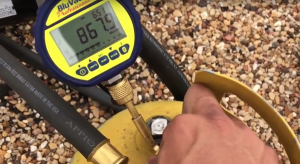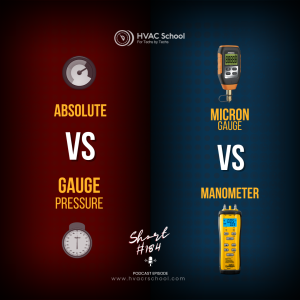BACK
 What is a Micron?
What is a Micron?
 Which Valve Do I Open First?
Which Valve Do I Open First?
 Don’t Install Your Micron Gauge at the Pump
Don’t Install Your Micron Gauge at the Pump
 Testing the Leak Rate on Your Micron Gauge Itself
Testing the Leak Rate on Your Micron Gauge Itself
 Testing the Leak Rate on Your Micron Gauge Itself
Testing the Leak Rate on Your Micron Gauge Itself
 How Long Should I Evacuate a System?
How Long Should I Evacuate a System?
 Testing the Leak Rate on Your Micron Gauge Itself
Testing the Leak Rate on Your Micron Gauge Itself
 Q&A – Vacuum Questions Answered
Q&A – Vacuum Questions Answered
 Absolute vs. Gauge Pressure (Micron Gauge vs. Manometer) – Short #184
Absolute vs. Gauge Pressure (Micron Gauge vs. Manometer) – Short #184
 Evacuation, Recovery, and Dehydration Facts Podcast
Evacuation, Recovery, and Dehydration Facts Podcast
 Solder Rings, Thermal Imaging, and My Grouchy Brother
Solder Rings, Thermal Imaging, and My Grouchy Brother
#micron gauge
Tech Tips:

To answer the question in the title, we use it as a measurement of pressure. REALLY, it is a measurement of distance. First, any scale CAN be used to measure vacuum (negative pressure) and positive pressure. The trick is knowing which is best suited for which and the size of the scale. Larger units of […]
Read more

Testo 557 vacuum gauge and Appion core removal tools shown I've had a change of heart. Back in the early 2000s, during the big construction boom, I did many system startups on residential units for a large company I worked for. When installers ran the line sets prior to startup, they weren't always very careful […]
Read more

Have you ever wondered why your old refrigerator never needs service or gauges installed and can run for 30 years that way, maybe only needing an occasional cleaning of the condenser? For crying out loud, utilities are buying these old energy hogs through some programs because they never seem to die. Why do they last […]
Read more

As a technician gains skill, they will learn that regularly testing your tools is a huge part of success. It isn't long in the field before techs find out that just because a meter or gauge gives a particular reading, it doesn't ALWAYS mean it is correct. Vacuum is one of these areas. Everything in […]
Read more

As a technician gains skill they will learn that regularly testing your tools is a huge part of success. It isn't long in the field before techs find out that just because a meter or gauge gives a particular reading it doesn't ALWAYS mean it is correct. Vacuum is one of these areas. Everything in an […]
Read more

This article was written by Jim Bergmann with MeasureQuick. Anyone who has ever picked up a vacuum pump has asked or been asked this question. To be truthful, it is like asking, “How many licks will it take to get to the center of a Tootsie Roll Tootsie Pop?” In the words of the wise […]
Read more
Videos:

As a technician gains skill they will learn that regularly testing your tools is a huge part of success. It isn't long in the field before techs find out that just because a meter or gauge gives a particular reading it doesn't ALWAYS mean it is correct. Vacuum is one of these areas. Everything in an […]
Read more
Podcasts:

In this episode of the HVAC School podcast, host Bryan dives deep into the topic of vacuum in HVAC and refrigeration systems. He addresses two questions from social media about vacuum, expanding them into a comprehensive discussion of best practices, common issues, and techniques for effective vacuum procedures. Bryan starts by explaining where to […]
Read more

In this short podcast episode, Bryan covers the differences between absolute and gauge pressure, as well as measuring pressure with a micron gauge or a manometer. Compression ratio deals with absolute suction and absolute discharge pressures. Absolute pressure requires us to add atmospheric pressure to the gauge pressure. We usually measure gauge pressure in […]
Read more

In this episode, Bryan covers evacuation, recovery, and dehydration. Evacuation refers to putting a vacuum pump on the system and pulling it down. We use a few different measures of vacuum, including inches of mercury (“Hg) or microns (millionths of a meter of mercury). We use such small units to measure a vacuum that effectively […]
Read more

In this episode of HVAC School, I talk with my brother Nathan… and he whines a lot about cool tools I like. As you might have guessed, Nathan is in the camp of people who believe that proper training promotes good practices; fancy tools won't make an outstanding tech. Even though I respectfully disagree with […]
Read more









